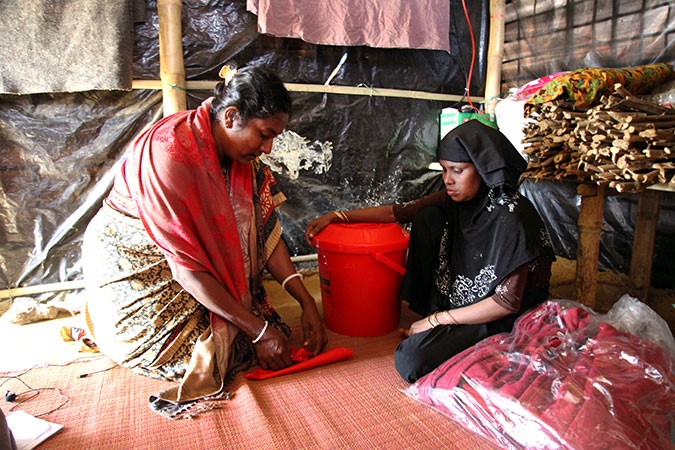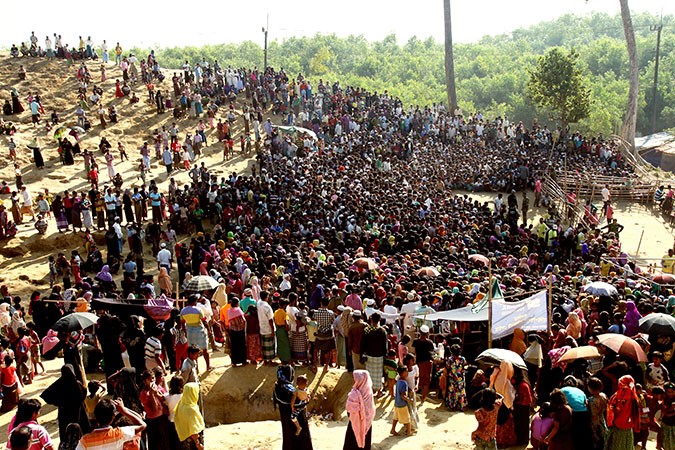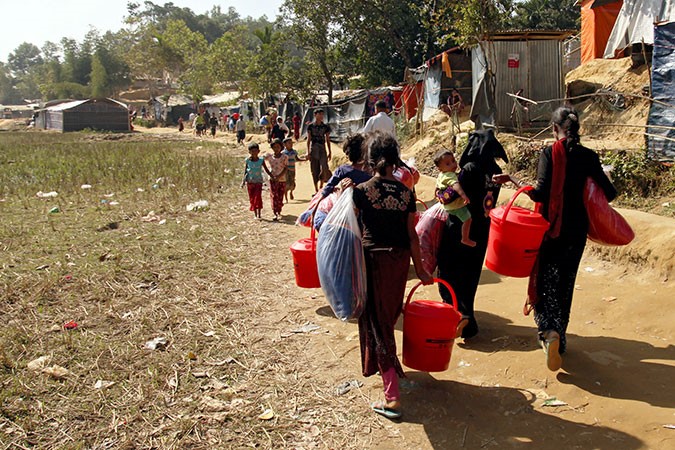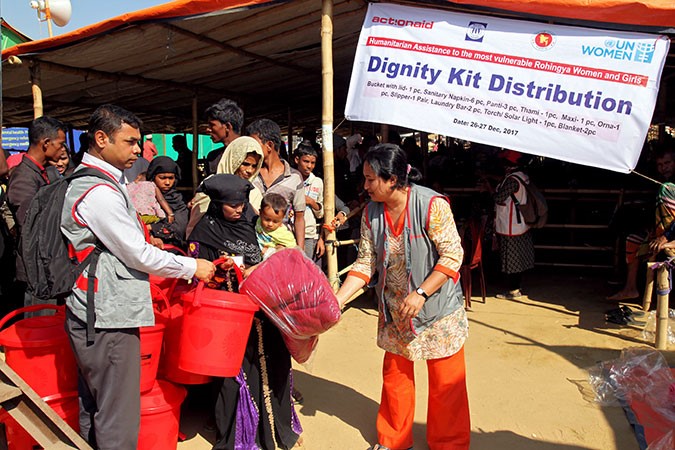Solar lamps, alternative fuel, feminine hygiene products—relief that counts in the practical needs of Rohingya women refugees
By UN WOMEN, 19 February 2018. Rohingya women in Cox’s Bazar receive dignity kits from UN Women, in partnership with the Ministry of Women and Children Affairs and ActionAid Bangladesh.

Photo: ActionAid Bangladesh/Md. Sariful Islam
Mahmuda Begum, 23,
lives in a makeshift settlement at the Moynerghona, Balukhali camp, in Cox’s
Bazar, Bangladesh. She arrived recently with a newborn baby she had delivered,
without any medical assistance, just before crossing the border of Myanmar. She
is among the estimated 688,000 new arrivals of Rohingya refugees to Cox’s Bazar
[1], and has
had a harrowing journey.
lives in a makeshift settlement at the Moynerghona, Balukhali camp, in Cox’s
Bazar, Bangladesh. She arrived recently with a newborn baby she had delivered,
without any medical assistance, just before crossing the border of Myanmar. She
is among the estimated 688,000 new arrivals of Rohingya refugees to Cox’s Bazar
[1], and has
had a harrowing journey.
“Being eight months pregnant, I had to endure inhumane suffering while
we were fleeing from our home,” she said. “My family spent five to six days
under the open sky, and had to cross hills and forests. Thousands of other
women also went through similar tribulations. We had no option but to keep
moving forward to find a shelter. I crossed the border for the sake of my baby.”
we were fleeing from our home,” she said. “My family spent five to six days
under the open sky, and had to cross hills and forests. Thousands of other
women also went through similar tribulations. We had no option but to keep
moving forward to find a shelter. I crossed the border for the sake of my baby.”
In September 2017, Mahmuda gave birth to a baby boy, and urgently
needed clothes, medicines and hygiene products and facilities for herself and
the newborn child—items that are not typically found in relief kits.
needed clothes, medicines and hygiene products and facilities for herself and
the newborn child—items that are not typically found in relief kits.

Bangladesh has been hosting Rohingya refugees from
Myanmar for nearly three decades now. Recently, however, the escalating
violence in Rakhine State, Myanmar, has displaced some 688,000 Rohingyas since
August 2017. Photo: ActionAid Bangladesh/Md. Sariful Islam
Myanmar for nearly three decades now. Recently, however, the escalating
violence in Rakhine State, Myanmar, has displaced some 688,000 Rohingyas since
August 2017. Photo: ActionAid Bangladesh/Md. Sariful Islam
Since the influx of Rohingya refugees started, many humanitarian
agencies have been trying their best to distribute essential relief items such
as soaps, clothes, scarves, menstrual hygiene products and flashlights to
women, packaged together into what is called a “dignity kit”. However, because
of the sheer number of incoming refugees, the unmet demand for dignity kits was
immense.
agencies have been trying their best to distribute essential relief items such
as soaps, clothes, scarves, menstrual hygiene products and flashlights to
women, packaged together into what is called a “dignity kit”. However, because
of the sheer number of incoming refugees, the unmet demand for dignity kits was
immense.
“Camps are overcrowded, needs are immediate and enormous, and
resources are stretched…”
resources are stretched…”
Through the months of December and January, UN Women, in partnership
with the Ministry of Women and Children Affairs (MoWCA) and ActionAid
Bangladesh in Cox’s Bazar, distributed dignity kits to 7,893 households,
specifically targeting female-headed households, pregnant and lactating women,
adolescent girls and women and girls with special needs.
with the Ministry of Women and Children Affairs (MoWCA) and ActionAid
Bangladesh in Cox’s Bazar, distributed dignity kits to 7,893 households,
specifically targeting female-headed households, pregnant and lactating women,
adolescent girls and women and girls with special needs.
“I am feeling more comfortable about taking care of myself and my baby
with these items and with the information I received on how to use them,” said
Mahmuda.
with these items and with the information I received on how to use them,” said
Mahmuda.
Bangladesh has been hosting Rohingya refugees from Myanmar for nearly
three decades now. Recently, however, the escalating violence in Rakhine State,
Myanmar, has displaced some 688,000 Rohingyas since August 2017, and just over
half of them are women and girls. The Rohingya refugees arrive with very few
possessions, impoverished and traumatized.
three decades now. Recently, however, the escalating violence in Rakhine State,
Myanmar, has displaced some 688,000 Rohingyas since August 2017, and just over
half of them are women and girls. The Rohingya refugees arrive with very few
possessions, impoverished and traumatized.
In the camps, there are many other challenges affecting women more than
men, for example, poor lighting.
men, for example, poor lighting.

In December and January, UN Women, in partnership
with the Ministry of Women and Children Affairs (MoWCA) and ActionAid
Bangladesh in Cox’s Bazar, distributed dignity kits to 7,893 households,
specifically targeting female-headed households, pregnant and lactating women,
adolescent girls and women and girls with special needs. Photo: ActionAid
Bangladesh/Md. Sariful Islam
with the Ministry of Women and Children Affairs (MoWCA) and ActionAid
Bangladesh in Cox’s Bazar, distributed dignity kits to 7,893 households,
specifically targeting female-headed households, pregnant and lactating women,
adolescent girls and women and girls with special needs. Photo: ActionAid
Bangladesh/Md. Sariful Islam
Rubina, 16, who fled
from escalating violence against the Rohingya people in Barinkathi, Rakhine State, Myanmar, and was separated
from her parents while crossing the Naf river, has found the solar lamp in her
dignity kit very useful.
from escalating violence against the Rohingya people in Barinkathi, Rakhine State, Myanmar, and was separated
from her parents while crossing the Naf river, has found the solar lamp in her
dignity kit very useful.
She said: “After dark, women and girls are often afraid to go outside
of their tents, even to access a toilet or to get water from the tube well.
Sometimes we cannot complete our daily household chores during the day, as we
have to go to several distribution points to collect relief items. As a result,
we are forced to work in the evening. This lamp is a relief for us! I can now
cook, wash dishes and fetch water in the evening,”
of their tents, even to access a toilet or to get water from the tube well.
Sometimes we cannot complete our daily household chores during the day, as we
have to go to several distribution points to collect relief items. As a result,
we are forced to work in the evening. This lamp is a relief for us! I can now
cook, wash dishes and fetch water in the evening,”
Like the solar lamps, rice husk briquettes, which UN Women has provided
to more than 6,000 Rohingya refugee households as alternative fuel, have also
been very helpful for women. Rice husk briquettes release less smoke, thus
improving the living condition of women and girls who had increasingly been
reporting respiratory and eye problems due to prolonged exposure to emissions
from the firewood they used inside their tents. Refugee women also received
blankets to protect themselves and their children from the exceptionally cold
weather in Cox’s Bazar in December.
to more than 6,000 Rohingya refugee households as alternative fuel, have also
been very helpful for women. Rice husk briquettes release less smoke, thus
improving the living condition of women and girls who had increasingly been
reporting respiratory and eye problems due to prolonged exposure to emissions
from the firewood they used inside their tents. Refugee women also received
blankets to protect themselves and their children from the exceptionally cold
weather in Cox’s Bazar in December.

UN Women and partners distribute essential relief
items such as soaps, clothes, scarves, menstrual hygiene products and
flashlights to women, packaged together into what is called a “dignity kit”.
Photo: ActionAid Bangladesh/Md. Sariful Islam
items such as soaps, clothes, scarves, menstrual hygiene products and
flashlights to women, packaged together into what is called a “dignity kit”.
Photo: ActionAid Bangladesh/Md. Sariful Islam
The experience in Bangladesh shows the importance of listening to
women’s voices and understanding their needs based on their gender role when
planning humanitarian response. Simple things like lighting and safe cooking
fuel can make a significant difference in reducing the exposure of women and
girls to risks and hazards. For Rubina and Mahmuda, it’s a matter of mobility,
health and safety.
women’s voices and understanding their needs based on their gender role when
planning humanitarian response. Simple things like lighting and safe cooking
fuel can make a significant difference in reducing the exposure of women and
girls to risks and hazards. For Rubina and Mahmuda, it’s a matter of mobility,
health and safety.
“UN Women is aware that women and men have different needs and
vulnerabilities in the time of crisis. Our role is to build awareness of the
humanitarian community about these differences so that we can prevent women and
girls from being marginalized in the relief activities and left behind,” said Shoko
Ishikawa, Country Representative of UN Women in Bangladesh.
vulnerabilities in the time of crisis. Our role is to build awareness of the
humanitarian community about these differences so that we can prevent women and
girls from being marginalized in the relief activities and left behind,” said Shoko
Ishikawa, Country Representative of UN Women in Bangladesh.
Read more about UN
Women’s comprehensive humanitarian response to the crisis here.
Women’s comprehensive humanitarian response to the crisis here.
Notes
[1]
As of 21 January 2018, ISCG Situation Report.
As of 21 January 2018, ISCG Situation Report.
If you want, watch our video about Rohingya Muslims in Myanmar:


